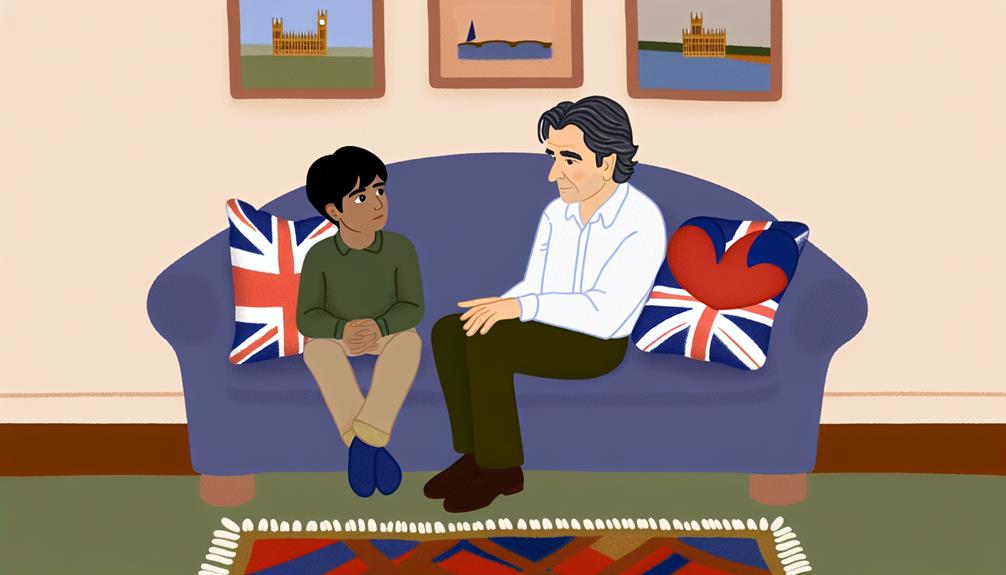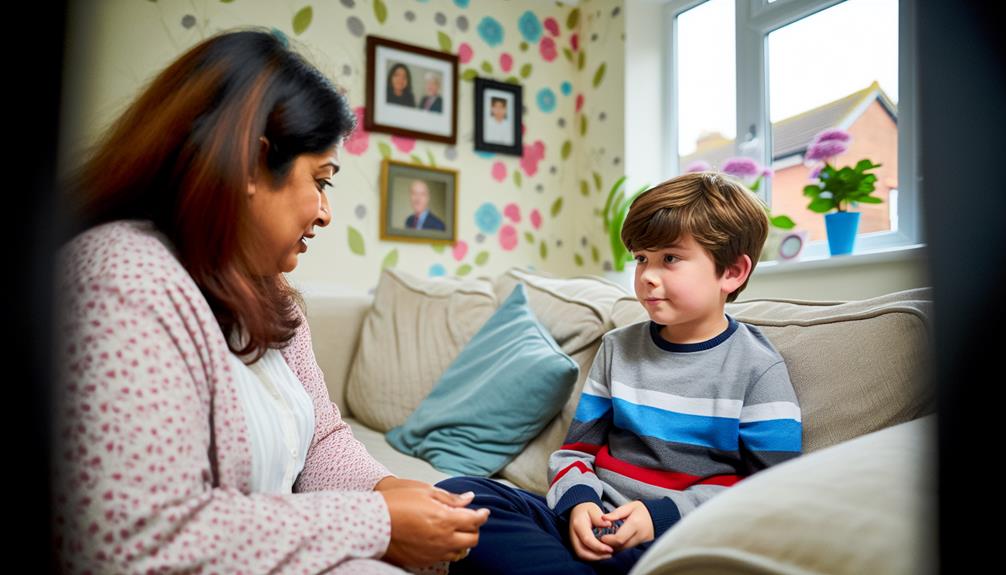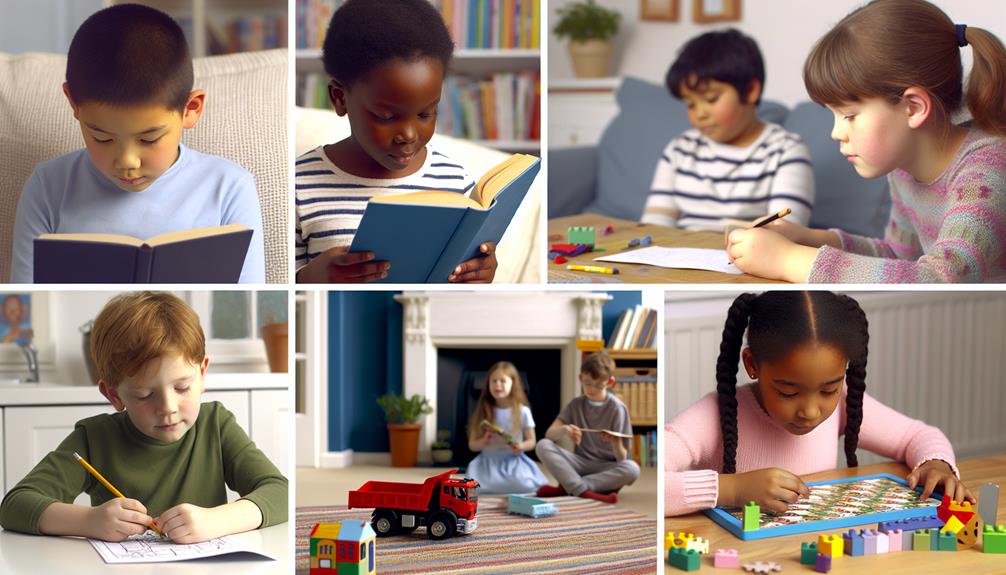Understanding the emotional complexities of UK foster kids is vital. They often grapple with issues like anxiety, depression, and PTSD, stemming from past traumas. Additionally, the stigma of fosterhood and disruption in attachments can fuel emotional distress. Luckily, therapeutic interventions like Cognitive-Behavioural, Trauma-Focused, and Family Therapy aim to bolster their resilience. Many foster care systems offer supportive networks, Art Therapy, and resources for detecting mental health concerns early. Educating yourself about foster care mental health can provide better support for these kids. Stick with us: there's so much more to uncover.
Key Takeaways
- Foster children in the UK frequently struggle with mental health issues like anxiety, depression, and PTSD due to past traumas.
- Therapeutic interventions such as Cognitive-Behavioural Therapy and Trauma-Focused Therapy are crucial in supporting foster children's mental health.
- Stigma and disruption in attachments in the foster care system can negatively impact a child's psychology and self-esteem.
- An effective support system for foster children includes regular peer support, art therapy, and collaboration with mental health professionals.
- Adoptive parents can address mental health concerns through pre-adoption education, regular check-ups, and immediate professional help during crises.
Understanding UK Foster Care System

To truly grasp the intricacies of the mental health challenges in UK foster care, it's essential for you to first understand the dynamics of the UK foster care system itself. Governed by a body of foster care legislation and childcare regulations, the system is intricate and complex, designed to protect the rights and wellbeing of vulnerable children.
The Children Act 1989 is a key piece of legislation, stipulating that the child's welfare should be the paramount consideration. This principle underpins all decisions about a child's upbringing, placement, and care. Local authorities are legally obliged to provide support and services to foster families, ensuring that every child in care has an equal chance at a fulfilling life.
However, exploring this labyrinth of laws and regulations can be challenging. Despite the system's intentions, the practicalities often fall short. Strained resources, overloaded social workers, and the sheer number of children in care can create challenges that ripple outwards, affecting the children at the centre of it all.
Understanding these intricacies equips you to comprehend the mental health realities for those within this system, which we'll explore in the next sections.
Common Mental Health Issues for Foster Children
You may already be aware that foster children often face unique emotional challenges. These can manifest as common mental health issues that require attention, understanding, and professional intervention.
Let's explore these issues and discuss the role therapy can play in supporting these children's mental health.
Foster Childrens Emotional Challenges
Sailing through the turbulent waves of emotions can be particularly challenging for foster children, as they often experience common mental health issues such as anxiety, depression, and post-traumatic stress disorder.
Attachment issues can be a significant hurdle, as forming healthy, stable relationships might be complex due to past traumas and instability. The trauma responses can manifest in various ways, like anger, withdrawal, or even self-harm.
Understanding these responses is essential to help these children navigate their emotional landscape. Keep in mind, patience and empathy are indispensable. These children aren't 'acting out,' they're reacting to their lived experiences.
It's an uphill battle, but with compassion and knowledge, we can help them find their footing in this emotional maelstrom.
Therapy for Foster Kids
Given the emotional challenges foster kids face, it's evident that therapy plays a crucial role in helping them manage their mental health issues. Art Therapy benefits these children greatly, offering them a non-verbal platform to express their feelings. Through creating, they learn to identify and manage emotions, improving their emotional well-being.
Animal Assisted Therapy is another potent tool. Interaction with animals has been proven to reduce anxiety and depression. It offers unconditional love and companionship, traits that foster kids may have missed out on.
As you explore further into these therapies, you'll realize their potential to transform lives. They're not just therapeutic modalities but also bridges to healing, understanding, and ultimately, to a healthier mental state.
The Impact of Foster Care on Child Psychology

You've seen how common mental health issues can affect foster children, now let's consider the deeper impact of foster care on child psychology.
Imagine the emotional turmoil kids face in fosterhood and the psychological coping mechanisms they develop to survive.
This journey won't be easy, but understanding it's pivotal to improving the UK's foster system.
Emotional Turmoil in Fosterhood
While it's undeniable that foster care can provide a safe haven for children in need, it's equally important to acknowledge the profound psychological impact this significant life change can have, often manifesting as emotional turmoil in foster children. Fosterhood stigma and the burden of trauma narratives can introduce an array of emotional complexities.
- Fosterhood stigma: This can lead to feelings of exclusion and difference, impacting a child's self-esteem and self-worth.
- Trauma narratives: The past experiences and painful memories these children carry can fuel emotional distress.
- Disruption in attachments: Frequent changes in caregivers can exacerbate feelings of instability and insecurity.
- Unresolved grief and loss: Children in foster care often grapple with the grief of losing their biological family, which can result in deep-seated emotional turmoil.
Understanding these factors is essential for developing effective mental health strategies within the foster care system.
Psychological Coping Mechanisms Explored
Despite the emotional challenges foster children face, it's vital to explore how they develop psychological coping mechanisms to help navigate the complexities of their situations. Resilience building becomes essential, allowing them to bounce back from adversity. It's not about ignoring the hurt but rather acknowledging it and then finding a way forward.
Mindfulness practices also play a significant role. They help children stay in the present, reducing anxiety about the future or sadness over the past. Mindfulness teaches them to control their reactions, providing a sense of stability in a world that often feels turbulent.
The Role of Therapy in Foster Care
Traversing the complexities of foster care, therapy plays a crucial role in providing emotional support and tools for resilience to the affected children. Through therapeutic interventions, you can foster resilience among children, enabling them to navigate the emotional turbulence that often accompanies life in foster care.
Therapy in foster care can take various forms, each with its unique set of benefits. Here are some key approaches:
- Cognitive-Behavioural Therapy (CBT): Assists children in identifying and changing harmful thinking patterns.
- Trauma-Focused Therapy: Helps children process traumatic experiences and develop coping mechanisms.
- Play Therapy: Allows younger children to express their feelings through play, which can be easier and more natural for them.
- Family Therapy: Involves the entire foster family in therapy sessions to foster better communication and understanding.
Case Studies: Childrens Experiences in Foster Care

Let's delve into the personal stories of children in foster care, shedding light on their unique experiences and the significant impact such journeys can have on their mental well-being.
One case study centers on a young boy named Ben. His foster care changes were frequent and sudden, causing worry and uncertainty. This lack of stability disrupted his sense of safety, intensifying his emotional turmoil. Ben's tale highlights the need for smoother changes in the system to safeguard children's mental health.
Another story involves Lucy, a teenager adopted after several years in foster care. Her adoption concerns were heightened by the fear of losing her new family, a common fear among adopted children. This worry stemmed from her past encounters with abandonment and regular shifts in caregivers.
Each narrative underscores the importance of understanding the individual experiences and mental health obstacles faced by children in foster care. It's crucial to take into account their past traumas, the impact of sudden shifts, and the worries they may have about adoption. By doing so, the foster care system can better assist these children and facilitate their journey towards a healthier mental state.
Support Systems for Foster Children
How can we effectively support the mental well-being of children in foster care? The answer lies in creating strong support systems that can buffer the psychological impact of displacement and provide a safe space for emotional expression.
Two such remarkable methods include Peer Support and Art Therapy. Peer Support allows foster children to connect with others who are in similar circumstances. They can share experiences, provide mutual support, and instill a sense of belonging. On the other hand, Art Therapy offers a non-verbal medium for children to express their feelings and experiences, promoting self-awareness and emotional healing.
Below are some key elements of an effective support system for foster children:
- Regular, structured Peer Support sessions to foster a sense of community and understanding.
- Incorporation of Art Therapy within the care system to facilitate emotional expression and healing.
- Training for foster parents to strengthen their understanding of a child's emotional needs.
- Collaboration with mental health professionals for early detection and treatment of psychological issues.
It's crucial that we continue to refine these strategies, ensuring that every child in foster care receives the emotional support they need.
Navigating Emotional Challenges in Foster Care

Often, as a child in foster care, you'll find yourself confronting a unique set of emotional hurdles that require careful navigation and understanding. Past traumas can create deep emotional scars, making resilience building an essential part of your journey. It's all about learning to bounce back, to heal, and to grow stronger in spite of the challenges thrown your way.
Foster care, while providing vital support, can often stir up feelings of uncertainty, a sense of not belonging, and the pain of previous traumas. Emotional resilience won't develop overnight; it's a process that requires time, patience, and a lot of self-care.
Trauma healing is another integral part of this journey. It's important to remember that it's okay to seek help, to talk about your experiences, and to express your feelings. You're not alone in this journey; there are mental health professionals and supportive networks available to guide you through this process.
The road to emotional resilience and trauma healing may be challenging, but remember, it's okay to take it one step at a time. You're learning, growing, and every step you take is a victory. You're stronger than you think, and with every challenge, you're building resilience.
Improving Mental Health Services in Foster Care
To truly support children in foster care, we need to focus on improving the mental health services available to them. It's important to address their unique needs with empathy and expertise, ensuring they receive timely, effective care.
The journey to improvement begins with:
- *Stigma Reduction*: It's essential to dismantle the stigma surrounding mental health, encouraging more open conversations and fostering an environment where children feel safe to express their emotions.
- *Interdisciplinary Approach*: Collaboration between social services, healthcare providers, schools, and community organizations can lead to more thorough and effective mental health care.
- *Accessible Services*: Mental health services should be readily available and easily accessible to foster children. This includes online resources and teletherapy options.
- *Specialized Training for Caregivers*: Foster parents and social workers should receive training to better understand and address the mental health issues that may arise in foster children.
Adoptive Parents: Addressing Mental Health Concerns

In the realm of adoption, it's essential that you, as an adoptive parent, are well-prepared to address potential mental health concerns in your child. The adoption process should incorporate parents' preparation for such situations.
Consider the following table:
| Stage | Action | Outcome |
|---|---|---|
| Pre-adoption | Thorough research and mental health education | Better understanding of potential challenges |
| Adoption process | Engage with mental health professionals | Early detection of possible issues |
| Post-adoption | Regular mental health check-ups for your child | Effective and timely intervention |
| Ongoing | Continued learning and adaptation | Adequate response to evolving needs |
| Crisis | Reach out to mental health support | Immediate professional help |
This table outlines a strategic approach to dealing with mental health concerns. Early preparation is essential; it's not just about getting ready to welcome a new member into your family, but also preparing to support them emotionally and psychologically. Understanding the potential mental health issues that might arise can help you provide a nurturing environment for your child. Regular checks and professional support are key to managing these concerns effectively. Remember, adoption is not just a process; it's the beginning of a life-long commitment to your child's wellbeing.
Frequently Asked Questions
What Is the Process to Become a Foster Parent in the Uk?
You'll need to complete an application, attend training sessions, and undergo home assessments to become a foster parent in the UK. It's a serious commitment, but creating a supportive homespace for a child is rewarding.
How Does the UK Foster Care System Compare to Other Countries?
You might think it's hard to compare, but when making international comparisons, the UK foster system evaluation shows it's more regulated and supportive, especially in mental health services, than many other countries' systems.
Are There Specific Training Programs for Foster Parents to Handle Mental Health Issues of Foster Children?
Yes, there are specific programs in the UK. They equip you with therapeutic interventions and resilience building strategies to effectively manage and improve the mental health of your foster child.
What Are the Possible Legal Implications for Adoptive Parents if a Foster Child's Mental Health Deteriorates?
If a foster child's mental health deteriorates, you could face legal accountability. Society's mental health stigma may impact perceptions and outcomes. It's essential to demonstrate proactive care and secure professional help when needed.
Can Foster Children Access Mental Health Support After They Leave the Foster Care System?
Indeed, you can access mental health support post foster care. UK's mental health legislation guarantees the provision of post care support, even after departing from the foster system. It's essential for your ongoing wellbeing.
Conclusion
It's alarming that nearly half of all UK foster children struggle with serious mental health issues.
As you've seen, the foster system can both help and hinder a child's psychological development. The key is understanding and addressing these challenges.
With the right therapy, support systems, and adoptive parents who are aware and proactive, we can make a world of difference.
We must endeavor to improve mental health services in foster care, for every child's sake.




